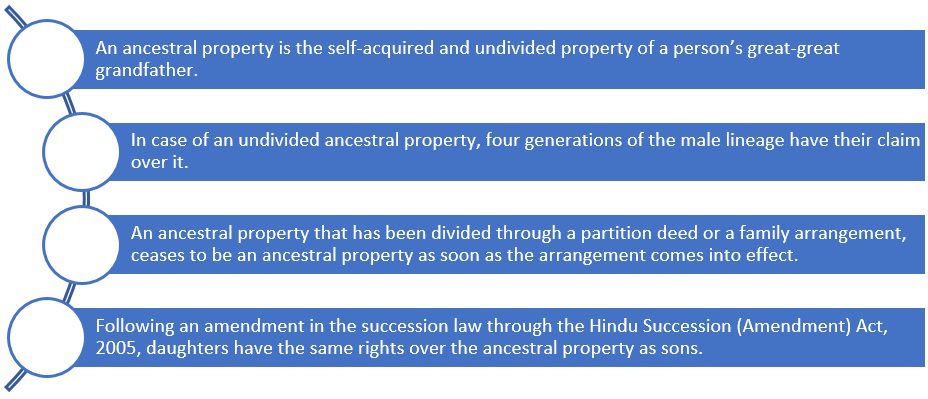The property in which you have a right since your birth and which you inherit from your parents and other family members is known as ancestral property. This guide will explain the nitty-gritty of this legal concept along side making you aware of the latest court judgements on the subject.
What is ancestral property?
An ancestral property is an undivided property in which four generations of a single family have their share. Once divided among the stakeholders, an ancestral property would stop being an ancestral property and turn into a self-acquired property.

See also: Gift deed vs will: Which is a better option to transfer property
What are the different types of ancestral property?
An ancestral property can be of the following types:
- Property inherited from a paternal ancestor
- Property inherited from a maternal grand-father
- Property inherited from collaterals or from women
- Share allotted on partition
- Property obtained by gift or will from a paternal ancestor
- Accretions
Which laws apply in division of ancestral property across religions in India?
Different laws are applicable depending on the religion of the person. In case of Hindus, Sikhs, Jains and Buddhists, provisions of the Hindu Succession Act are applicable. In case of Muslims provision of the Muslim personal law are applicable. In case of Christians and Parsis, the Indian Succession Act, 1865, is applicable.
How many generations can claim ancestral property?
In an undivided ancestral property, four generations of the male lineage have their claim. Basically, the father, the grandfather, the great grandfather and the great-great grandfather have inheritance rights over an undivided ancestral property. This means, say, on Ram’s ancestral property, his son Shyam, Shyam’s son Ghanshyam and Ghanshyam’s son Radhe Shyam have inheritance rights.
Also, whenever someone inherits a property from any of his paternal ancestors up to three generations above him, his legal heirs of up to three generations below him would get equal right, as coparceners in that property. So, when Radhe Shyam inherits a property from his father, three generations below him would have an inheritance claim on it.
See also: Benefits of self-acquired properties
What is an undivided property?
If Ram decided to divide the property between Shyam and his other sons, the chain will be broken and the property inherited by Shyam will no longer qualify as an ancestral property but a self-acquired property. Simply stated, for a property to remain ancestral, no division should take place up to the four generations. An ancestral property that has been divided through a partition deed or a family arrangement, ceases to be an ancestral property as soon as the arrangement comes into effect. In other words, when a division or a partition takes place in a joint Hindu family, the property becomes self-acquired in the hands of the family member, who has received it.
Passing its judgment in the Uttam versus Saubhag Singh & Others case on March 2, 2016, the Supreme Court ruled that a joint family property ceases to be a joint family property in the hands of the various persons who have succeeded to it under Section 8 of the Hindu Succession Act, 1956, as they hold the property as tenants in common and not as joint tenants.
See also: Types of land ownership
Do gifted properties qualify as ancestral?
Properties that one acquires by way of a gift deed and through the execution of a will do not qualify as ancestral properties. Also note that through a gift deed, a father can give this self- acquired property to a third party in his lifetime. Through a will, the property ownership is transferred after the demise of the donor.
See also: Can gift deed be revoked
Exclusion from ancestral property
One is free to write a will and exclude one’s offspring (sons as well as daughters) from inheriting their self-acquired property. In 2016, the Delhi High Court ruled that an adult son had no legal claim on his parents’ self-acquired property.
Father can cut son off from his self-acquired property
“Where the house is a self-acquired house of the parents, a son, whether married or unmarried, has no legal right to live in that house and he can live in that house, only at the mercy of his parents up to the time the parents allow,” the HC order said.
See also: All about probate meaning
Father can’t cut son off from ancestral property
The same, however, is not true for ancestral property. A father does not have a choice to exclude his son from possession of his ancestral properties. However, the Delhi HC, in November 2018, ruled that harassed parents can evict their children from any type of property. The type of the property, ruled by the HC, would in no manner act as a deterrent in eviction of children and legal heirs, who ill-treat their elderly parents.
After an amendment in the laws through the Delhi Maintenance and Welfare of Parents and Senior Citizens (Amendment) Rules, 2017, through which the term ‘self-acquired’ was done away with, seniors can apply for eviction of their sons, daughters and legal heirs from the property of any kind ─ movable or immovable, ancestral or self-acquired, tangible or intangible.
Start of right in an ancestral property
In case of ancestral properties, the right of the stakeholder arises at the time of his birth. In other forms of inheritance, such as inheritance through a will, the right arises at the time of the owner’s death. So, in the above stated example, Shyam’s right in his ancestral property will arise at the time of his birth and not at the time of his father Ram’s demise.
Also read: Varisu Certificate: Apply and download legal heir certificate online in Tamil Nadu
Share of each generation in ancestral property
The share of each generation is first determined and the share of successive generations is further subdivided from the share. Note here that the share of each member in his ancestral property is constantly decreasing as newer members keep adding into the family. That means, at some point, your share in the property might become quite insignificant and not worth pursuing.
Extent of claim over ancestral property
The previous generation will have a prior claim on an ancestral property. This means that the claim of the following generations will be a sub-division of what is left after the property is divided among the stakeholders of the prior generation. Simply stated, the rights of the stakeholders in an ancestral property are decided on a per-stripe basis and not on a per-capita basis.
If Ram has two brothers, their ancestral property will first be divided into three shares. The share of each brother can then be divided among their offspring and so on.
Women’s right in ancestral property
Before an amendment was made in the Hindu Succession Act, 1956, women did not enjoy a right on their ancestral property after their marriage as they were not considered as coparceners. The old laws basically denied coparcenary status to women.
After the amendment in the succession law through the Hindu Succession (Amendment) Act, 2005, women have been accepted as coparceners. Now, both, sons and daughters, are coparceners in the family and share equal rights and liabilities over the property. A daughter remains a coparcener in the property even after her marriage. While it said that a daughter has the same rights over the ancestral property as the sons, the SC put a caveat that both, father and daughter, had to be alive on September 9, 2005, for this provision to come into force. In 2018, however, the SC ruled that a daughter can inherit her deceased father’s property, irrespective of whether the father was alive on this date or not. However, properties acquired from one’s maternal side do not qualify as ancestral properties.
See also: Property rights of a Hindu daughter under the Hindu Succession Amendment Act
Mother can claim share in her deceased son’s ancestral property: HC
The mother of a deceased son has a share in her son’s ancestral and joint family property under the Hindu Succession Act, the Karnataka High Court (HC) has ruled. As the Class-1 heir of her late son, the mother can demand her share even if her husband were alive, the high court has clarified.
While allowing an appeal by one T N Susheelamma, the HC said, “Since the deceased passed away leaving behind the mother, wife and son and they are the Class-I heirs of the deceased Hindu male member of the joint family, the original appellant (Susheelamma) is also entitled for a share in the property left by the deceased Santhosh as Class-I heir and the very approach of the first appellate court is erroneous.”
“No doubt, her husband is alive. But, as soon as her son passed away, she became the Class-I heir of the deceased son and the same was not considered by the trial court and erroneously proceeded that the mother cannot be considered as co-parcener and she cannot claim any independent share in the ancestral and joint family properties,” the high court observed.
Mother has no right to relinquish property rights of minor children: Telangana High Court
A mother has no right to relinquish the rights of her minor children on their ancestral property without their knowledge and consent, the Telangana High Court has ruled. While giving its verdict in the Smt T Vijaya versus Sri Turkapalli Mallaiah case, the high court said that this legal position has been pronounced by orders of the Supreme Court.
Under Indian Succession Act, mother not legal heir of man who dies intestate: HC
Under the Indian Succession Act of 1925, the assets of a man who dies without leaving a will are divided between his widow and children, the Madras High Court (HC) has ruled. The mother of the deceased has no right in the properties of her late son, the high court clarified while giving its judgment in a recent case. The mother is entitled to get a share in her late son’s property only in the absence of his surviving wife and children, the two-judge bench of Justice R Subramanian and Justice N Senthilkumar ruled. “As per the rules under Section 33 and 33-A, where a Christian dies intestate leaving behind a widow and lineal descendants, 1/3rd of the property would go to the widow and remaining 2/3rd will go to the lineal descendants,” it said while delivering its verdict on an appeal filed by one Agnes alias Karpaga Devi and her minor daughter.
Women’s right in agricultural land
Even though the 2005 has made daughters an equal stakeholder in ancestral property, this rule often ignored at the time of division of agricultural land in India. This is primarily because land in India is a state subject while the Hindu Succession Act is primarily a central law. In many Indian states, agricultural land is divided according to state-specific laws that don’t treat daughter as equal beneficiaries of ancestral property.
See also: Can second wife claim property of first wife
Son-in-law’s right in property of his father-in-law
Since a son-in-law is not considered a part of the family of his father-in-law, he has no right in a property owned by the latter. According to a recent ruling by the Kerala High Court, a son-in-law will have no right in a property belonging to his father-in-law, even if he has given money for the construction work of the said property.
“When the father-in-law is in possession of the property, the son-in-law cannot plead that he had been adopted as a member of the family, subsequent to the marriage with his daughter and has right in the property. Residence of the son-in-law is permissive in nature. (The) son-in-law cannot have any legal right to his father-in-law’s property and building, even if he has spent an amount on the construction of the building,” the HC said while giving its verdict in the Davis Raphel versus Hendry Thomas case.
Laws governing ancestral properties
While ancestral property is divided under the provisions of the Hindu Succession Act, 1956, among Hindus, Sikhs, Jains and Buddhists, the rules in this regard are governed by the Indian Succession Act, 1925, in case of Christians. In case of Muslims, provisions of the Muslim Personal Law (Shariat) Application Act, 1937, apply.
Among Christians, the inheritance and succession rules treat men and women equally. Also, their property is treated as self-acquired, in spite of its mode of acquisition and during one’s lifetime, nobody else can contest for it.
Under the Muslim law, there are two types of heirs – the sharers, who are entitled to a certain share in the deceased’s property and the residuary, who takes up the share in the property that is left over after the sharers have taken their share.
Who can sell an ancestral property?
While the head of a Hindu undivided family (HUF) has the power to manage the family assets under the Hindu law, an ancestral property cannot be sold by the sole decision of one or part owners, since four generations have their claim over such a property. The consent of each stakeholder will be required, to sell an undivided ancestral property. All coparceners, including daughters, can seek partition and sale of the ancestral property. In case a stakeholder is denied his share in the property or in case one member decides to sell the property without consulting other members, a legal notice could be sent to the offending party, demanding your rights.
See also: Who is a Karta in a Hindu Undivided Family?
What is the right of a wife in her husband’s ancestral property?
Under the Hindu law, the wife of a man is entitled to get a share in her husband’s ancestral property in the capacity of his Class-I heir after his demise. Rules are not so straightforward, when it comes to the husband’s self-acquired property. In case he dies leaving a will and cutting his wife off of his self-acquired property, his wishes will take prevalence.
Children born in live-in relationships have right to ancestral property
According to a June 2022 order by the Supreme Court, children born out of a live-in-relationship can claim their right in their father’s ancestral property.
“It is well settled that if a man and a woman live together for long years as husband and wife, there would be a presumption in favour of wedlock. Such a presumption could be drawn under Section 114 of the Evidence Act…The law presumes in favour of marriage and against concubinage, when a man and a woman have cohabited continuously for a number of years,” the apex courts has ruled.
Do illegitimate children have right in ancestral property?
In Bharatha Matha & another versus R Vijaya Renganathan & others, and Jinia Keotin versus Kumar Sitaram cases, the apex court had ruled that children born out of a void marriage were not entitled to claim inheritance of the ancestral coparcenary property. They could claim their share only in their parents’ self-acquired property.
hearing a reference of the Revanasiddappa versus Mallikarjun case regarding the scope of Section 16(3) of the Hindu Marriage Act, 1955.
Grandchildren can’t claim right to grandfather’s self-acquired property if father relinquishes right: SC
The Supreme Court in January 2023 said that grandchildren can’t claim a share in the self-acquired property of their grandfather, if their father has already relinquished his rights in the said property in exchange for money.
An SC Bench said that once a son relinquishes his right in the self-acquired property of his father in exchange for money, the principle of estoppel will apply in case of his sons and successors.
In 2015, the Madras High Court had also ruled that grandchildren were not entitled to claim a share in the self-acquired property of their paternal grandfather if it had been allotted to their father in a family partition in his capacity as legal heir and not as a coparcener under the Hindu Succession Act.
Daughters don’t lose right in parent’s property because they got dowry: HC
The right of daughters in their paternal property does not get extinguished because a dowry was given at the time of their wedding, the Goa Bench of the Bombay High Court has ruled. “Even if it is assumed that some dowry was provided to the daughters, that does not mean that the daughters cease to have any right in the family property. The rights of the daughters could not have been extinguished in the manner in which they have been attempted to be extinguished by the brothers, post the father’s demise,” the Bench said while giving its order in case where a brother has made a transfer deed without getting consent of his sister.
Family property received by Hindu woman through partition deed is not inheritance: HC
An ancestral property received by a Hindu woman through a registered partition deed cannot be termed inheritance under the Hindu Succession Act, the Karnataka High Court has ruled. Consequently, such a property will not go back to the heirs of the woman’s father upon her demise, the HC added.
Read full coverage here.
Father’s self-acquired property given to children by will/gift retains its status unless stated otherwise
According to the Supreme Court, in case a father leaves his self-acquired property to his children through a gift deed or through a will, the property retains its status as a self-acquired property and won’t turn into an ancestral property unless stated otherwise in the deed.
Right to property as a coparcener different from right of maintenance
Property given to a wife or daughter as maintenance is not the same as giving them a share in property, the Dharwad Bench of the Karnataka High Court has ruled. In an order dated April 5, 2023, the single judge-Bench of Justice Anant Ramanath Hegde also ruled that exception made to Section 6 (1) of the Hindu Succession Act, 1956, cannot apply if property partition is in violation of a court order.
Read full coverage here.
Adopted child stops being coparcener of birth family: HC
An adopted child stops being a coparcener of their birth family and consequently gives up any right or interest in the family ancestral property, the Telangana High has ruled. In an order dated June 27, 2023, the high court said that only if a partition took place before the adoption and the property was allotted to the adopted person, they could carry that property to their new family.
“Only if a partition has taken place before the adoption and property is allotted to his share or self acquired, obtained by will, inherited from his natural father or other ancestor or collateral which is not coparcenary property held along with other coparceners and property held by him as sole surviving coparcener, he carries that property with him to the adoptive family with corresponding obligations,” said the full Bench of the HC.
The Kalaburagi Bench of the Karnataka High Court has reiterated the same in a more recent order.
“This Court in the case of M Krishna versus M Ramachandra and Another has also reiterated the view that if the adoptee was the member of the joint family at the time of adoption, his rights in the joint family property extinguish unless, he possessed those properties by way of partition. It was observed that on adoption the adoptee gets transplanted in a family in which he is adopted with the same rights as that of a natural born son and as such, transfer of the adopted child severs all his right with the family from which he was taken in adoption. It was categorically held that, he loses right of succession in the genitive family properties,” the HC said in its order dated July 14, 2023.
Property bought in homemaker wife’s name is joint family asset: Allahabad HC
Property bought by a husband in the name of a housewife with no independent source of income will be categorized as the family’s joint property, the Allahabad High Court (HC) has ruled. Such property, prima facie, becomes the property of the joint Hindu family, the HC said in an order dated February 15, 2024.
“This court under Section 114 of the Indian Evidence Act may presume the existence of fact that the property purchased by a Hindu husband in the name of his spouse, who is a homemaker and does not have an independent source of income, will be the property of family, because in common course of natural event Hindu husband purchases a property in the name of his wife, who is homemaker and does not have any source of income for the benefit of family,” the court observed.
FAQs
What is an ancestral property?
An ancestral property is a property or a land parcel that belonged to one’s ancestors.
What are the types of properties under the Hindu law?
According to the Hindu law, properties can be classified into two types: an ancestral property and a self-acquired property. The self-acquired and undivided property of a person’s great-great grandfather becomes an ancestral property.
Can a daughter ask for the partition of an ancestral property?
All coparceners, including daughters, can seek a partition and sale of an ancestral property.
Who are eligible for ancestral property?
Four generations of a family can claim their right in their ancestral property.
What is the difference between inherited and ancestral property?
Ancestral property is that which remains undivided. Once an ancestral property is divided among its stakeholders, is will be branded an inherited property.
Who is legal heir for ancestral property?
According to the Hindu Succession Act, legal heirs can be categorized in Class-I and Class-II heirs. Class-I heir of the deceased include his the widow, children and mother. Class-I heir of the deceased include his father, grandchildren, great grandchildren, brother, sister and other relatives.
Can ancestral property be sold?
An undivided ancestral property cannot be sold without the consent of all the successors.
Can ancestral property be transferred?
After its division, an ancestral property can be transferred by coparceners to anyone they like.
Can ancestral property be gifted?
Even though one has a claim over inherited property, one can't gift it if the ownership is shared with others.
Is ancestral property taxable?
There is no tax applicability on the inherited assets, movable and immovable under the Income Tax Act of 1961 until one decides to sell it.
| Got any questions or point of view on our article? We would love to hear from you. Write to our Editor-in-Chief Jhumur Ghosh at [email protected] |

An alumna of the Indian Institute of Mass Communication, Dhenkanal, Sunita Mishra brings over 16 years of expertise to the fields of legal matters, financial insights, and property market trends. Recognised for her ability to elucidate complex topics, her articles serve as a go-to resource for home buyers navigating intricate subjects. Through her extensive career, she has been associated with esteemed organisations like the Financial Express, Hindustan Times, Network18, All India Radio, and Business Standard.
In addition to her professional accomplishments, Sunita holds an MA degree in Sanskrit, with a specialisation in Indian Philosophy, from Delhi University. Outside of her work schedule, she likes to unwind by practising Yoga, and pursues her passion for travel.
[email protected]












